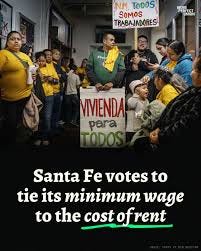Santa Fe first city in USA to tie minimum wage to rent
"“It is the responsibility of the City of Santa Fe to ensure its workforce receives equitable and competitive wages."
Santa Fe took a small but long-overdue step toward reality this week.
After years of watching working families pushed to the brink by the spiraling cost of simply existing in northern New Mexico, the Santa Fe City Council voted Wednesday night to raise the minimum wage from $15 to $17.50 in 2027.
The most interesting part isn’t the number — it’s the formula behind it.
For once, a city is admitting out loud what every renter has known for decades: the cost of housing is what’s killing us.
Reilly S. White, a professor at the University of New Mexico who helped build the city’s new calculation, said Santa Fe is effectively the first municipality in the country to tie future wage increases not just to inflation but to the cost of rent itself.
“We investigated six different minimum wage scenarios,” he said. “This one — combining CPI with housing costs — is the one the council adopted. We don’t typically see this anywhere else.”
In other words: a US city finally stopped pretending the Consumer Price Index alone can measure the actual cost of survival.
The ordinance passed 5–2.
Councilors Pilar Faulkner and Lee Garcia — the latter a business owner — argued that raising wages could harm the very workers it’s meant to help, an argument that resurfaces every time labor wins even a fraction of what corporate America quietly takes for itself.
The debate even got hung up on language. Should Santa Fe call this a “living wage,” or would that imply workers might actually be able to live on it?
Mayor-elect Michael Garcia pushed back on the label, saying the increase may not truly meet the threshold of a living wage, but still supported the measure as a necessary step. “It is the responsibility of the City of Santa Fe to ensure its workforce receives equitable and competitive wages,” he said.
One amendment will at least put city employees under the new standard a year early, starting in January 2026. For everyone else — the people bagging groceries, cleaning hotel rooms, staffing restaurants, keeping the tourism economy functioning — the wait is longer.
Labor organizers with Somos Un Pueblo Unido and the Chainbreaker Collective were clear: this isn’t generosity. It’s acknowledgment. Rent in Santa Fe has soared beyond anything CPI-based models can keep up with.
Since 2003, the city’s old living-wage formula nudged wages up 50 to 70 cents a year — utterly detached from a housing market that has doubled and redoubled, pushing families into cars, overcrowded rentals, or out of the city altogether.
Santa Fe’s own data makes the point. This year, using CPI alone, the city calculated a living wage of just $14.60 an hour — a number that would be laughable if it weren’t so cruel.
Meanwhile, food pantries like The Food Depot are overwhelmed. Executive director Jill Dixon described workers employed full-time, even juggling multiple jobs, still hovering on the edge of needing emergency food to get through the week. “What do systemic solutions really look like?” she asked. No one had to answer — the evidence is already in front of them.
Outgoing Mayor Alan Webber sponsored the ordinance as one of his final acts. Opponents — mostly business owners — raised familiar warnings about cost burdens. But White’s research echoes a growing body of national evidence: there’s little sign that modest minimum-wage increases significantly reduce employment. Yes, employers may trim hours or raise prices slightly, but those impacts are “very, very small” compared with the gains for workers.
What’s different now is that Santa Fe is no longer pretending housing is some separate, unfortunate side issue. It is the issue. And by acknowledging the weight of rent in the minimum-wage formula, the city is finally aligning its policy with the economic reality its residents have been forced to live in.
It’s a step — not the solution. But at least it’s aimed in the right direction.



I love this. Maybe the idea will catch on. I hope it works and works and works. I live in a college town in Missouri. Housing prices here are out of control...for buyers and for renters. A squalor rental can cost two thousand a month. Utility prices are about to rise again, and I swear they will tax you for using the sidewalk. I am all for taxes...they are necessary...but they are not equitable. Tax the rich, raise the wage!